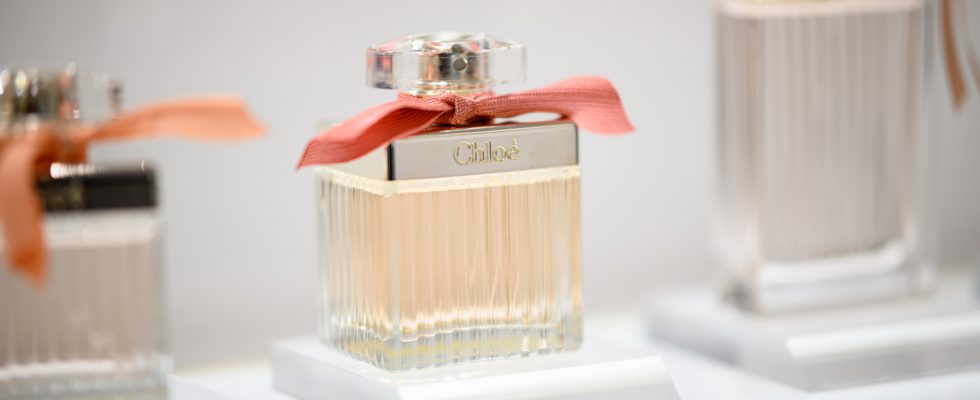Status: 04/23/2023 3:30 p.m
There is only one place like this in the world and it is no coincidence that it is in Versailles, France: Thousands of perfumes are kept in the Osmothek. It shows the creativity of an industry.
Not “Small Talks”, but “Smell Talks” is the name of the latest podcast that the Osmothek is helping to create. It is based on the campus of the University of Perfumery, Cosmetics and Food Flavors in Versailles, which trains 100 perfumers – known in technical jargon as “noses” – every year.
Storage at the highest level of security
Only a few are allowed in the high-security wing of the Osmothek. Director Anne-Cécil Pouant opens up and explains: “Here we are in the heart of the Osmothek – in the basement where 5,000 perfumes are preserved in refrigerators at twelve degrees in tinted glass bottles, including 850 that are no longer available, and thousands of raw materials that make it possible for us allow perfumes to be remade according to original formulas.”
However, the Osmothek does not keep the formulas in the basement, but in a bank safe. It is only opened according to the strictest security protocol – almost like a nuclear case. Perfume has three enemies: light, heat and oxygen. That’s why every fragrance in the flacon is sealed with argon gas, which is heavier than air.
Founded 30 years ago
“Experts around Jean Kerléo worked in the company of French perfumers over 30 years ago to classify perfumes and draw up a kind of family tree for them,” says director Pouant. “They wanted to have it in front of their noses, to smell the history of perfumery. That’s how the idea for the Osmothek came about.”
Its founder has a fine nose and distinguishes 2000 scents. Even when he was retired, Kerléo still opened his suitcase for workshops – with flacons full of essences and aromas. What is a perfume? “For me it’s a feeling that is expressed through a scent,” says the founder of the Osmothek. “It should last a long time, beautify life and complete one’s personality like a new hairstyle. A perfume should be like a ray of sunshine on a dull day and be seductive.”
The underestimated sense
Kerléo has reconstructed perfumes such as that of the 1st century AD king of the Parthian Empire in Iran. In the annals the 27 ingredients were found – honey, ebony oil, wine, spices, myrrh and resin, but not quantities. His sense of smell put the puzzle together.
That sense was underestimated, says Kerléo – until his loss to Covid made him realize just how important it is. “The nose: You always thought you didn’t need it. Taste is important. But we taste 90 percent through our sense of smell. Without it, you don’t feel like anything anymore.”
Economic factor worth billions
But the golden age of perfumery, when good natural products met new synthetic molecules in the mid-20th century, is over for the old master. “The industry does not take chances with the most expensive and rarest substances if they want to successfully launch a new perfume on the market,” laments Kerléo. “Ingredients that are difficult to find or that could be criticized from an environmental point of view are being replaced. So we’re at a different stage.”
Irrespective of this, France’s perfume industry is an economic engine worth billions. It increased its exports by 30 percent in 2022, especially to Germany. The Osmothek is an important hinge: It is like a beehive – new scents fly in every day and they are a testament to the creativity of the industry.
Tracking down Napoleon’s scent
The Library of Fragrances passes on their knowledge. Even the little noses of two-year-olds learn to sniff. Isabelle Chazot heads the Osmothek’s Science Council: “We organize more than 100 workshops a year on the history of the relationship between man and perfume,” she explains. “They first honored their gods with fragrances, got rid of stench, healed diseases – and then perfume became a weapon of seduction. Today it is part of well-being and an expression of each individual’s individuality.”
In the “Show Room” the guests see 500 perfume bottles and a fragrance organ. You will learn what kind of water Napoleon smelled of when he was in exile on St. Helena or how the perfume of the “Queen of Hungary” smelled from the 14th century, in which alcohol distilled with flowers and rosemary was used for the first time.
“That’s the osmotheque. It also preserves emotions,” says Chazot. “The scents trigger feelings in us, depending on what we have experienced. Perfumes touch the individual memory, but also the collective memory of an entire epoch.” The Osmothek perfumers also visit retirement homes and prisons. The scent of teenage love? The scent of freedom? Everything in the bottle.
The Osmothek of Versailles- In the only library of fragrances
Stefanie Markert, ARD Paris, April 21, 2023 11:11 a.m

